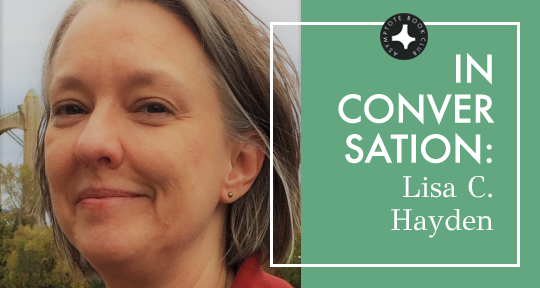Of her award-winning novel, Three Apples Fell From the Sky, Armenian-Russian author Narine Abgaryan said: “I wanted to write a story that ends on a note of hope.” We at Asymptote were proud to present, as our March Book Club selection, this magical realist folktale exploring both the merciless procession of worldly tragedies and the human capacity for courage and imagination. In the following interview, our own Josefina Massot speaks to Lisa C. Hayden, the translator of Three Apples Fell From the Sky and other renowned Russian fictions, about the book’s internal logic, the relief of routine amidst a global strangeness, and the instinct of switching between narrative voices.
The Asymptote Book Club aspires to bring the best in translated fiction every month to readers around the world. You can sign up to receive next month’s selection on our website for as little as USD15 per book; once you’re a member, you can join the online discussion on our Facebook page!
Josefina Massot (JM): You’ve made a point of only translating books you love, and many of them delve into the concept of history. Vladislav Otroshenko’s Addendum to a Photo Album and Marina Stepnova’s The Women of Lazarus seem to specifically explore it through the lens of family, which is also the case with Abgaryan’s Three Apples Fell From the Sky—the story of Maran is reflected in a series of family sagas: Anatolia’s, Vasily’s, Vano’s, and Valinka’s, etc. Tolstoy’s own War and Peace, which you’ve referred to as your favorite novel, chronicles early-nineteenth-century Tsarist society by honing in on five aristocratic clans . . . Could you elaborate on why you’ve been so consistently drawn to the theme of family history, and whether there’s something eminently “Russian” about it?
Lisa C. Hayden (LCH): I’m not sure I have a good direct answer to your questions! I’ll try to approach them from a slightly different angle, though. One of the elements I look for in books is a solid sense of internal logic: ideally, I want each piece of a novel, each layer, each word, to fit together harmoniously. That doesn’t mean they can’t be chaotic, but the chaos should fit the book’s logic. I wonder if perhaps fictional families—be they functional or dysfunctional, chaotic or calm—inherently bring a natural order to a novel. And if that order, which may at least hint at genre- and/or family-related hierarchies, structures, and motifs, might give the novelist a sort of head start on writing a book where all the pieces fit together. All that said, other aspects of novels draw me, too. Psychology and even a certain voyeurism are important to me as is (always!) interesting writing that innovates without becoming overwritten, purple prose. READ MORE…

